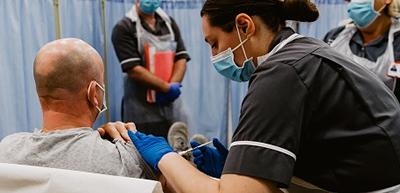COVID vaccine after infection reduces risk of Long Covid

A new study involving Dr Nisreen Alwan from the Faculty of Medicine, has shown vaccination after having the SARS-CoV-2 infection, the virus responsible for COVID-19, is associated with a decrease in the likelihood of Long Covid symptoms.
Vaccines against COVID-19 are effective at reducing rates of coronavirus infection, transmission, hospital admission, and death. Evidence also suggests that Long Covid is reduced in those who are infected after vaccination, but the effectiveness of vaccination on pre-existing Long Covid is less clear.
The latest survey by the UK’s Office for National Statistics (ONS) shows that 44% of people who report Long Covid have had symptoms for at least one year, two thirds of whom report symptoms severe enough to limit their day-to-day activities.
The study, which is published in The BMJ, set out to estimate associations between COVID-19 vaccination and Long Covid symptoms in adults with SARS-CoV-2 infection before vaccination.
The researchers drew on ONS data for 28,356 adults aged 18-69 years (average age 46; 56% women; 89% white) who received at least one COVID-19 vaccine dose after testing positive for SARS-CoV-2 infection.
They then tracked the presence of Long Covid symptoms over a seven-month follow-up period (February to September 2021). Symptoms of any severity were reported by 6,729 participants (24%) at least once during follow-up.
A first vaccine dose was associated with an initial 13% decrease in the odds of Long Covid but it is unclear from the data whether this improvement was sustained over the following 12 weeks, until a second vaccine dose was given.
Receiving a second vaccine dose was associated with a further 9% decrease in the odds of Long Covid and this improvement was sustained at least over an average follow-up of nine weeks.
Similar results were also found when the focus was on Long Covid severe enough to result in limitation of day-to-day activities.
Dr Alwan said: “Our study indicates evidence of sustained average improvement in Long Covid symptoms after the second dose of the COVID19 vaccine, but within a limited follow-up period. Vaccination may help lessen Long Covid symptoms impacting on daily life in some individuals but given the episodic nature of this illness longer follow-up is needed.”
Due to the study’s observational design, causality cannot be inferred, nor can the researchers rule out the possibility that other unmeasured factors, such as those related to take-up of a second vaccine dose, may have affected their results.
However, results were consistent after taking account of sociodemographic characteristics, health related factors, vaccine type, or duration from infection to vaccination, suggesting that they withstand scrutiny.
